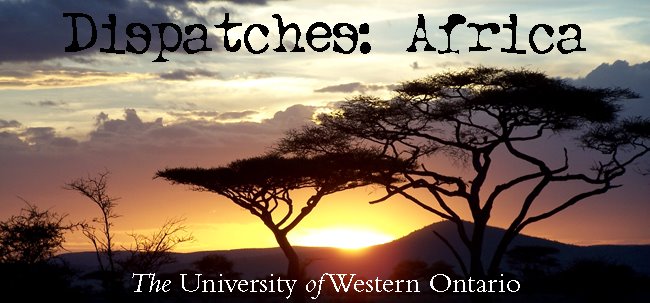 |
| Activity at the Kenya-Uganda border, at Busia. |
As I had attempted to fill out the various pieces of paper on the bus, the wavy scrawl of ink had risen and fallen with each pothole etched into the road that carried me from Kisumu. Road crews had mounded entirely insufficient cones of dirt along the road to fill the gaps, but they were of little use just sitting there.
The border featured a slouching metal fence painted in the chipping colours of Kenya’s flag. Buses and trucks alike bunched up as we cleared customs, walked across no-man’s land and into Uganda’s immigration office. Once cleared, we wove between jaggedly parked vehicles to find our bus, navigating through salespeople carrying boxes of beverages and snacks on their heads. Impoverished children slapped at the side of the bus and called up through the open window, making hand gestures that mimicked eating.
Pulling into Uganda, the sky became a watercolour of mottled greys and my nausea increased because of the bus's 1.5-hour late start this morning – and the tight deadline I faced for my plane home. Donning sunglasses, a boxer jogged along the road with taped hands, jabbing at the wind. Each time I checked my watch, I felt as though I had taken one of his punches to my gut.
Farther along, a woman raked the dirt out front of her house with a paint roller that had no sponge. A rural field was speckled with scarecrows whose heads were made from black garbage bags. Clever. In a larger town, a giant billboard featured a man with two women draped over him under the banner, “Be handsome, and fair.” It was for fair skin cream for men. What?
 |
| My unanticipated home in Entebbe for more than 24 hours. |
Finally arriving at the bus park, I haggled with the taxi driver out of respect, but hit the road soon thereafter, hoping to eke in under the wire. Naturally, he needed to stop for fuel now that he had a fare. Reaching the airport at Entebbe, heavily armed police pulled us from the vehicle to do a thorough search, and the ill feeling in my stomach rose into my throat.
The city is on edge given recent strikes and violence related to the re-election of President Yoweri Museveni, who was sworn in yesterday. I, too, was on edge – but I had hope.
Unfortunately, that is all I had: I missed check-in my 15 minutes.
Hashtag: Fail.








